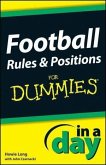Through a blend of historical analysis, behavioral psychology, and game theory, readers discover why sports as diverse as basketball and cricket share common regulatory principles. The text progresses through three major sections, beginning with the fundamental principles of rule creation, moving to an analysis of how regulations influence player strategy, and concluding with an examination of rule modification processes.
Drawing from extensive research, including interviews with officials and statistical analyses, the book presents compelling insights into how rules have adapted to address safety concerns, ensure fair play, and maintain competitive balance. Historical examples demonstrate the fascinating evolution of sports regulations, from ancient games to today's technology-influenced officiating systems.
What sets this comprehensive work apart is its interdisciplinary approach, connecting sports regulation to legal systems, psychology, and economics. Written for sports administrators, coaches, and analysts, the book provides practical applications while maintaining scholarly rigor. By examining both professional and amateur sports, it offers valuable insights into how rule systems can be effectively created and modified while preserving the integrity of the game.
The author's objective presentation of controversial rule changes allows readers to form their own informed conclusions about the future of sports regulation.
Dieser Download kann aus rechtlichen Gründen nur mit Rechnungsadresse in A, B, BG, CY, CZ, D, DK, EW, E, FIN, F, GR, H, IRL, I, LT, L, LR, M, NL, PL, P, R, S, SLO, SK ausgeliefert werden.









